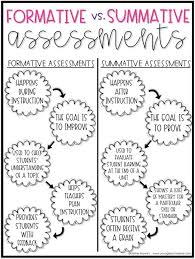All Things Assessment
Assessment is important. Assessment is ongoing. Assessment is not just for students. Assessment is part of a cycle and should drive instruction. It can be a daunting task, but there are options available to fit for any teacher, student, and lesson. You have informal/formal and formative/summative options to integrate into your lessons. 52
One can use informal assessments that takes place during the learning process. Observation and monitoring of student conversations as they discuss as a whole group or with partners can give valuable information.When a teacher is walking around the classroom or working with a large group, student discussions can help you to immediately assess where your students currently stand. Misconceptions can be addressed as well as highlight student thoughts to share with the whole class. No grades are given during this assessment; students are more relaxed. Take away the stress of a student feeling the pressure of a "test" and they feel led to share their learning more freely.
Formal assessments are structured and exactly what the term indicates-more "formal". However, we can be creative in the ways we deliver and construct these comprehensive assessments. While the state standardized tests are out of our control, we can help our students become more acclimated to the high-states testing atmosphere. Formal assessments take place after the lesson or unit has been completed. Seeing where your students currently stand after the end of a lesson is necessary. We must make sure our assessments are reliable and valid. Paying attention to those two important factors will give us a true window into our students' learning.
So let's talk about formative assessments, which is basically another term for informal assessments. Students can compose journal entries daily/weekly when given topics related to current lessons. Games such as Kahoot, Quizziz, and Socrative can be accessed through various devices. As a teacher, you can design quick assessments for your students and have them complete at their convenience or participate in some friendly competition with their classmates.
As for summative assessments, which falls in the same category as formal assessments, there are many ways to deliver this to your students. Beyond a standard paper/computer high-stakes test, we must continually think of different ways to assess our students. When thinking of presentations, don't limit your students to only a poster or speech in front of their peers. Students can design an intriguing web presentation with interactive tools to teach others about a current unit they have studied. Dramatic plays or songs could be composed and performed for the class, school. or a larger audience. Student portfolios are another great tool to express learning. These portfolios can be completed on a device and shared with others, completed on paper and other various mediums, or a combination of the two.


One can use informal assessments that takes place during the learning process. Observation and monitoring of student conversations as they discuss as a whole group or with partners can give valuable information.When a teacher is walking around the classroom or working with a large group, student discussions can help you to immediately assess where your students currently stand. Misconceptions can be addressed as well as highlight student thoughts to share with the whole class. No grades are given during this assessment; students are more relaxed. Take away the stress of a student feeling the pressure of a "test" and they feel led to share their learning more freely.
Formal assessments are structured and exactly what the term indicates-more "formal". However, we can be creative in the ways we deliver and construct these comprehensive assessments. While the state standardized tests are out of our control, we can help our students become more acclimated to the high-states testing atmosphere. Formal assessments take place after the lesson or unit has been completed. Seeing where your students currently stand after the end of a lesson is necessary. We must make sure our assessments are reliable and valid. Paying attention to those two important factors will give us a true window into our students' learning.
So let's talk about formative assessments, which is basically another term for informal assessments. Students can compose journal entries daily/weekly when given topics related to current lessons. Games such as Kahoot, Quizziz, and Socrative can be accessed through various devices. As a teacher, you can design quick assessments for your students and have them complete at their convenience or participate in some friendly competition with their classmates.
As for summative assessments, which falls in the same category as formal assessments, there are many ways to deliver this to your students. Beyond a standard paper/computer high-stakes test, we must continually think of different ways to assess our students. When thinking of presentations, don't limit your students to only a poster or speech in front of their peers. Students can design an intriguing web presentation with interactive tools to teach others about a current unit they have studied. Dramatic plays or songs could be composed and performed for the class, school. or a larger audience. Student portfolios are another great tool to express learning. These portfolios can be completed on a device and shared with others, completed on paper and other various mediums, or a combination of the two.


No comments:
Post a Comment